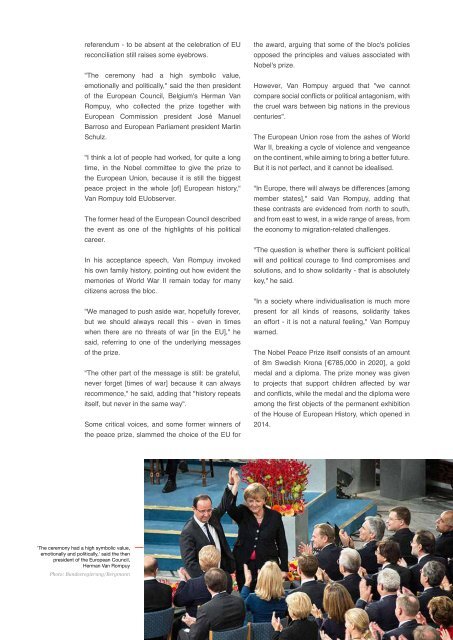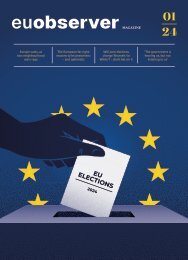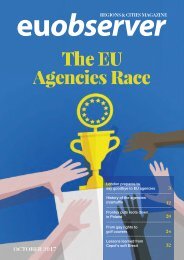20 years of European journalism & history
Twenty years doesn't seem a lot. Certainly not in the light of European history. But while we were writing this magazine for the 20th anniversary of EUobserver, we were surprised just how much happened in the European Union in those two decades.
Twenty years doesn't seem a lot. Certainly not in the light of European history.
But while we were writing this magazine for the 20th anniversary of EUobserver, we were surprised just how much happened in the European Union in those two decades.
You also want an ePaper? Increase the reach of your titles
YUMPU automatically turns print PDFs into web optimized ePapers that Google loves.
eferendum - to be absent at the celebration <strong>of</strong> EU<br />
reconciliation still raises some eyebrows.<br />
"The ceremony had a high symbolic value,<br />
emotionally and politically," said the then president<br />
<strong>of</strong> the <strong>European</strong> Council, Belgium's Herman Van<br />
Rompuy, who collected the prize together with<br />
<strong>European</strong> Commission president José Manuel<br />
Barroso and <strong>European</strong> Parliament president Martin<br />
Schulz.<br />
"I think a lot <strong>of</strong> people had worked, for quite a long<br />
time, in the Nobel committee to give the prize to<br />
the <strong>European</strong> Union, because it is still the biggest<br />
peace project in the whole [<strong>of</strong>] <strong>European</strong> <strong>history</strong>,"<br />
Van Rompuy told EUobserver.<br />
The former head <strong>of</strong> the <strong>European</strong> Council described<br />
the event as one <strong>of</strong> the highlights <strong>of</strong> his political<br />
career.<br />
In his acceptance speech, Van Rompuy invoked<br />
his own family <strong>history</strong>, pointing out how evident the<br />
memories <strong>of</strong> World War II remain today for many<br />
citizens across the bloc.<br />
"We managed to push aside war, hopefully forever,<br />
but we should always recall this - even in times<br />
when there are no threats <strong>of</strong> war [in the EU]," he<br />
said, referring to one <strong>of</strong> the underlying messages<br />
<strong>of</strong> the prize.<br />
"The other part <strong>of</strong> the message is still: be grateful,<br />
never forget [times <strong>of</strong> war] because it can always<br />
recommence," he said, adding that "<strong>history</strong> repeats<br />
itself, but never in the same way".<br />
Some critical voices, and some former winners <strong>of</strong><br />
the peace prize, slammed the choice <strong>of</strong> the EU for<br />
the award, arguing that some <strong>of</strong> the bloc's policies<br />
opposed the principles and values associated with<br />
Nobel's prize.<br />
However, Van Rompuy argued that "we cannot<br />
compare social conflicts or political antagonism, with<br />
the cruel wars between big nations in the previous<br />
centuries".<br />
The <strong>European</strong> Union rose from the ashes <strong>of</strong> World<br />
War II, breaking a cycle <strong>of</strong> violence and vengeance<br />
on the continent, while aiming to bring a better future.<br />
But it is not perfect, and it cannot be idealised.<br />
"In Europe, there will always be differences [among<br />
member states]," said Van Rompuy, adding that<br />
these contrasts are evidenced from north to south,<br />
and from east to west, in a wide range <strong>of</strong> areas, from<br />
the economy to migration-related challenges.<br />
"The question is whether there is sufficient political<br />
will and political courage to find compromises and<br />
solutions, and to show solidarity - that is absolutely<br />
key," he said.<br />
"In a society where individualisation is much more<br />
present for all kinds <strong>of</strong> reasons, solidarity takes<br />
an effort - it is not a natural feeling," Van Rompuy<br />
warned.<br />
The Nobel Peace Prize itself consists <strong>of</strong> an amount<br />
<strong>of</strong> 8m Swedish Krona [€785,000 in <strong>20</strong><strong>20</strong>], a gold<br />
medal and a diploma. The prize money was given<br />
to projects that support children affected by war<br />
and conflicts, while the medal and the diploma were<br />
among the first objects <strong>of</strong> the permanent exhibition<br />
<strong>of</strong> the House <strong>of</strong> <strong>European</strong> History, which opened in<br />
<strong>20</strong>14.<br />
'The ceremony had a high symbolic value,<br />
emotionally and politically,' said the then<br />
president <strong>of</strong> the <strong>European</strong> Council,<br />
Herman Van Rompuy<br />
Photo: Bundesregierung/Bergmann<br />
27 — EUOBSERVER ANNIVERSARY <strong>20</strong><strong>20</strong>

















